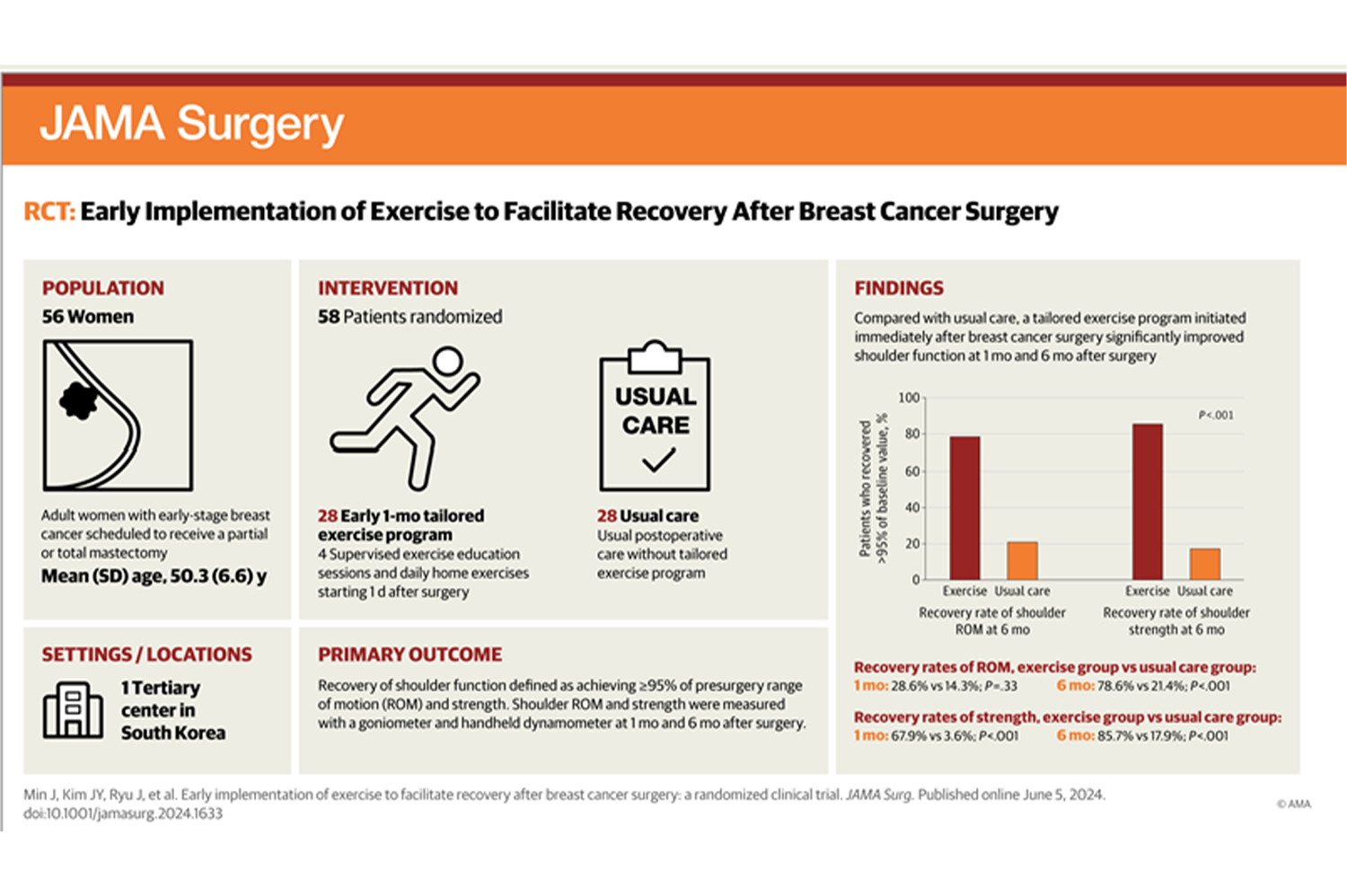Excellent Effects of Immediate Post-surgery Exercise for Breast Cancer
Professor Justin Y. Jeon and Professor Seung-il Kim’s teams reveal the excellent effects of immediate post-surgery exercise for breast cancer
Early exercise immediately after breast cancer surgery can restore upper limb function
without side effects
67.9% of the exercise group regained their shoulder strength to the pre-surgery level
within one month after surgery
Professor Justin Y. Jeon’s team from the Department of Sport Industry Studies, in collaboration with Professor Seung-il Kim’s team from Yonsei Cancer Center, has revealed the effect of customized exercise on upper limb function recovery immediately after breast cancer surgery. While various studies have suggested that “exercise is the best medicine,” this is the first time that immediate post-surgery exercise has been proven to be a groundbreaking treatment for restoring upper limb function in breast cancer patients.
Breast cancer has been the leading type of cancer among women in recent years. Surgical intervention is a primary treatment aiming to completely or partially excise tumors. However, despite advancements in medical technology, approximately 20% of patients undergoing breast cancer surgery experience various after-effects. One of the most common physical after-effects is impairment of upper limb function.
Many studies have repeatedly shown that postoperative exercise during the recovery period positively impacts the upper limb function of breast cancer patients. However, clinical settings often lack sufficient information on which exercises patients should perform, when to start them, and how much to do after surgery, due to factors such as timing, intensity, and type of exercise.
Against this backdrop, the research team thoroughly investigated factors such as constraints on exercise and the speed of upper limb function recovery according to different surgical methods for breast cancer patients, over approximately five years starting from 2017. Based on these results, they developed tailored exercise programs suited to the patient’s surgical method and upper limb function, validating their effectiveness.
The findings showed that when an exercise specialist provided customized exercise training during four outpatient visits within a month after surgery, and patients performed exercises at home using booklets and videos, the upper limb function recovered rapidly within one month.

At one month post-surgery, 67.9% of the exercise group had regained shoulder strength to the preoperative level, whereas only 3.6% of the control group had recovered. In addition, at six months, 85.7% of the exercise group had regained their shoulder strength to the preoperative level even without additional interventions. Contrarily, only 17.9% of the control group had regained their shoulder strength to the preoperative level at six months. This indicates that early exercise immediately after breast cancer surgery may be highly effective for upper limb function recovery. Breast cancer patients included in the exercise group were found to engage in more physical activities even six months after surgery, compared to the control group, and they were found to maintain a higher quality of life.
The method of exercise intervention, involving only four training sessions with an exercise specialist and home-based exercises using videos, appears to be highly cost-effective and positively impacts the improvement of quality of life and prevention of recurrence in breast cancer patients.
Professor Jeon stated, “It has been widely accepted that impairment of upper limb function after breast cancer surgery is inevitable, and rehabilitation treatment has been sought only for lymphedema or severe upper limb dysfunction. This study demonstrates the effectiveness of starting exercise from the first day after surgery to restore upper limb function without side effects. It not only holds academic value but is also a crucial study that can be directly applied to patient care.
The research was published in the prestigious international surgical journal “JAMA Surgery (IF 16.681)” on Jun 5 (local time).
Find out more:
Title of article: Early Implementation of Exercise to Facilitate Recovery After Breast Cancer Surgery: A Randomized Clinical Trial
DOI: https://jamanetwork.com/journals/jamasurgery/article-abstract/2819794
Journal : JAMA Surgery
Contact corresponding author : Prof. Justin Y. Jeon (jjeon@yonsei.ac.kr)
Recommended Articles
Professor Hyuk-Jae Chang
Professor Sung-Joo Hwang